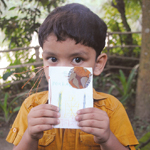LETTER HOME – Jessica Posner ’09 and Kennedy Odede ’12
Last summer Jessica Posner ’09, with Kenyan born Kennedy Odede ’12, co–founded the Kibera School for Girls in Kenya, the first free school in the region, as well as the nonprofit Shining Hope for Communities. Their next project will be a clinic focusing on women’s health, to open in the fall of 2010. It will be called the Johanna Justin–Jinich Memorial Clinic of Kibera to honor the memory of the slain Wesleyan student who had hoped to work in the field of global women’s health. Leah Lucid ’10 (Justin–Jinich’s best friend), Arielle Tolman ’10, and Inslee Coddington ’10, are also involved in this project. For more information please go to www.hopetoshine.org.
Days in Kibera, Africa’s largest slum, have a frenzied pace. I can see the intense daily struggles of Kibera’s 1.5 million residents to simply survive. Working here for the past three years I’ve learned to take nothing for granted: education, health, or dreams coming true. Here, girls are forced to trade sex for food, beginning as early as age six. School is only a distant dream.
Yet even here there are moments where time holds still long enough for everyone to acknowledge a miracle. August 18, 2009, was one such day: the day we dedicated the Kibera School for Girls, along with the community, demonstrating a collective belief in the power of hope.
At 8 a.m., our parents and the 45 students in our first three classes began to arrive—the students in their freshly pressed uniforms—the first new clothing any of our girls had ever owned.
By the time Kennedy and I arrived, parents and children were singing. One mother stood in the center leading a call and response song. She lifted her voice in praise singing, “That’s why we love you God, when we think there is no hope you prove us wrong. When we search for death you give us life?you show us that there is a brighter day, a day of peace, a second chance, you teach us to keep singing songs of hope.” The children clapped, danced, and sang along, and I felt shivers go down my back.
I thought about Cathy Majuma and how her story forever changed my life. Cathy wanted to learn about the world, and through hard work she got a sponsor to help her pay school fees. However, her mother burned Cathy’s belongings, angry that she was not doing enough housework. Cathy then moved in with her father, but he abused and impregnated her. She became a prostitute and was almost killed by a man who beat her because she asked him to wear a condom. Soon after, Cathy found a lump in her breast. When Cathy told me her story, I tried to convince her not to submit to a man who wanted to forcefully marry her. Although I found a doctor willing to give Cathy medical care without charge, I never her saw again, and I learned one of Kibera’s harsh lessons: there is such a thing as too late.
This lesson inspired me to build the Kibera School for Girls, and as I looked at our students on the day of the dedication, I hoped that their fates would be different than Cathy’s. However, a nagging part of me knew that without health care, without proper nutrition, our students were still at tremendous risk.
Countless women in Kibera, like Cathy, die from easily treatable illnesses or during childbirth. Kibera has taught me about the fragility of living, the reality that life is for now, but not forever. Our own Wesleyan community has also recently been faced with this difficult reality, as Johanna Justin–Jinich ’10 was tragically slain last spring.
Since the school opened we have dreamed of starting a health center focused on women’s health to make the future of our students and the Kibera commmunity brighter. After conversations with Johanna’s friends and family, we will name the clinic in her honor, as she planned to dedicate her life to a career in women’s public health in places like Kibera.
Working in Kibera and Johanna’s tragic death have shown me that while the world is a dark place filled with random acts of horror and inequality, sprigs of hope can bloom even from the depths of sadness. As Johanna’s mother, Ingrid Justin, writes, “To see a health clinic in Kibera that devotes itself to healing the bodies and souls of women and girls, so that they, in turn, can more fully care for their own families and contribute to their own communities?what a wonderful expression of Johanna’s aspirations.”
Back at our dedication ceremony, two students play a game of tag on the sidelines. As one falls and then gets up again, the other breaks out into peals of laughter, and I smile to see their incredible resilience.



